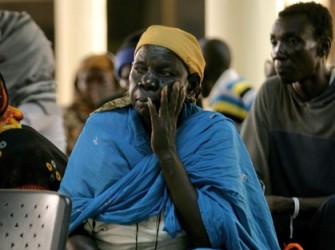South Sudan mulls 40% cut in government officials
June 29,2012 (JUBA) – South Sudan is proposing cutting the numbers of government and elected officials by 40% in a bid to reduce the public spending as the country faces a severe economic crisis.

The proposal in the draft report seen by Sudan Tribune appears to be part of austerity plan including drastic measures aiming to cut monthly spending and increasing the non-oil revenue.
Expenditure in the 2012 budget will be 6.4 billion South Sudanese pounds ($2.4bn), down from over SSP 10 billion ($3.7bn) in the original 2011-12 budget, the report says.
The new amended budget attempts to reign in public expenditure and salaries of state employees.
The draft proposal merges some ministries and independent commissions, reducing the government to 17 federal cabinet ministers, five independent commissions, and cutting number of departments in various ministries and institutions to key essential units.
It puts an end to free education and recommends higher learning institutions asking students to pay for their tuition fees and accommodation.
The draft report, which still requires the approval of the cabinet, aims at eliminating over 84 constitutional posts. Also, any foreign trip, will have to be approved by South Sudan cabinet.
A cabinet minister, who is overseeing the draft, told Sudan Tribune his team is already experiencing difficulties with some of senior government officials, as they fear the proposal would seriously affect their status once it is implemented.
“We are already experiencing difficulties. Some people are avoiding sharing with us how they would want the government to look like. They are not giving us the information we require in term of structures of their ministries, their composition, essential departments, essential employees, who, in this case, are people with tested expertise”, the cabinet minister said, requesting to remain anonymous.
“Actually I am not supposed to speak to the media at this stage because it is still a draft. I may talk to the media only after it is tabled before the council of ministers,” he said.
The senior government official attributed lack of cooperation to getting required information to fear that inflation running about 80% as a result of deteriorating exchange rate, increased imports and the rise in the price of basic commodities across the country would compound the suffering of the impoverished and already stretched new nation.
The minister said he was opposed to cutting salaries of employees but appeared supportive of slashing the size of the cabinet, to allow the government put more money into agriculture, security, health, education, and physical infrastructure development.
Earlier this year in a confidential note to the South Sudan government, the World Bank said the drastic cutting of public spending by 77%, can allow the government to use its reserves to December 2013.
The Bank also pointed out that the percentage of population in living in poverty will jump from 51% in 2012 to 83% in 2013. In gross numbers 3.6 million more people will fall below the poverty line.
(ST)
